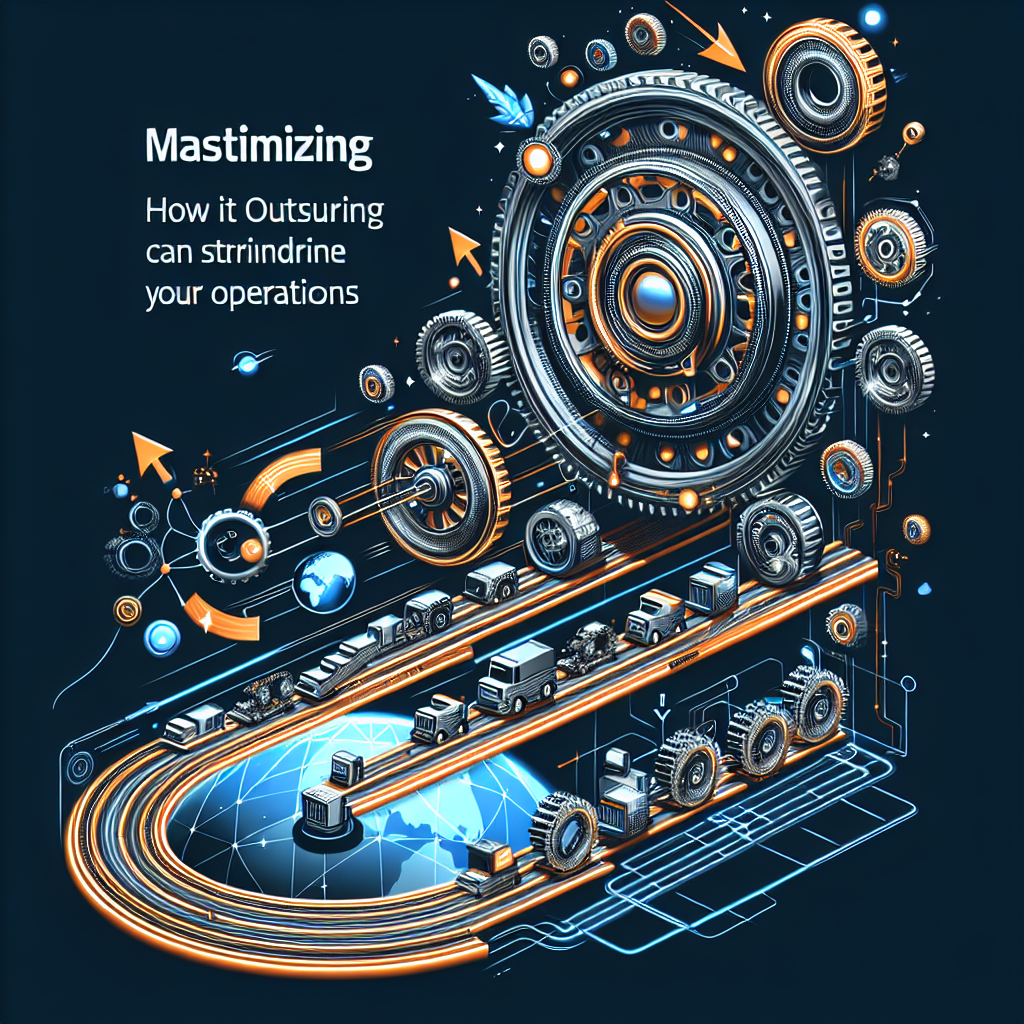Your cart is currently empty!
Tag: Outsourcing

The Impact of Outsourcing Technical Support Services on Business Performance
Outsourcing technical support services has become a common practice among businesses looking to improve their overall performance and efficiency. By entrusting the management of technical support to external service providers, companies can focus on their core operations and strategic goals, while ensuring that their IT infrastructure is well-maintained and supported.The impact of outsourcing technical support services on business performance can be significant. Here are some key benefits that businesses can experience when they choose to outsource their technical support needs:
1. Cost savings: Outsourcing technical support services can help businesses reduce their operational costs significantly. By outsourcing, companies can avoid the need to invest in expensive infrastructure, equipment, and personnel. Instead, they can rely on the expertise and resources of external service providers, who can provide high-quality technical support at a fraction of the cost.
2. Improved efficiency: By outsourcing technical support services, businesses can ensure that their IT systems are well-maintained and supported, leading to improved efficiency and productivity. External service providers can offer round-the-clock support, quick response times, and proactive maintenance, helping businesses minimize downtime and maximize uptime.
3. Access to specialized expertise: Outsourcing technical support services allows businesses to access specialized expertise and knowledge that may not be available in-house. External service providers often have a team of skilled professionals with diverse technical backgrounds and experience, enabling them to address a wide range of technical issues and challenges effectively.
4. Scalability and flexibility: Outsourcing technical support services provides businesses with the flexibility to scale their support services up or down, depending on their needs and requirements. External service providers can quickly adapt to changes in workload and demand, ensuring that businesses receive the support they need, when they need it.
5. Focus on core operations: By outsourcing technical support services, businesses can free up their internal resources and focus on their core operations and strategic goals. This allows companies to allocate their time, energy, and resources more effectively, leading to improved overall performance and competitiveness.
In conclusion, outsourcing technical support services can have a positive impact on business performance, by helping companies reduce costs, improve efficiency, access specialized expertise, and enhance scalability and flexibility. By entrusting their technical support needs to external service providers, businesses can streamline their operations, enhance their IT infrastructure, and achieve greater success in today’s competitive business environment.

IT Outsourcing vs. In-House Solutions: Making the Best Choice for Your Business
In today’s fast-paced and technology-driven world, businesses are constantly looking for ways to stay competitive and efficient. One of the key decisions that companies often face is whether to outsource their IT services or keep them in-house. Both options have their pros and cons, and choosing the best solution for your business depends on a variety of factors.IT outsourcing has become increasingly popular in recent years, as it offers companies a cost-effective way to access specialized skills and expertise without the need to hire and train in-house IT staff. Outsourcing also allows businesses to scale their IT services up or down as needed, providing flexibility and cost savings. Additionally, outsourcing can free up internal resources and allow employees to focus on core business activities.
On the other hand, keeping IT services in-house offers businesses more control and visibility over their IT operations. In-house IT staff are more familiar with the company’s specific needs and can provide more personalized support. Additionally, having an in-house IT team can help ensure that sensitive data and information are kept secure and confidential.
When deciding between IT outsourcing and in-house solutions, it’s important to consider the specific needs and goals of your business. Factors to consider include the size and complexity of your IT infrastructure, your budget, and the level of control and security you require. It’s also important to evaluate the expertise and experience of potential IT outsourcing partners, as well as their track record of success.
Ultimately, the best choice for your business will depend on a variety of factors, and there is no one-size-fits-all solution. Some businesses may benefit from outsourcing certain IT services, while others may prefer to keep everything in-house. By carefully weighing the pros and cons of both options and considering your specific needs, you can make the best choice for your business and ensure that your IT operations are efficient, secure, and cost-effective.

Avoiding Common Pitfalls: How to Ensure a Smooth IT Outsourcing Transition
Outsourcing IT services has become a popular option for businesses looking to cut costs and improve efficiency. However, transitioning to an outsourced IT model can be challenging, and there are several common pitfalls that businesses should avoid to ensure a smooth transition.One of the most common pitfalls in IT outsourcing is failing to clearly define goals and expectations. Before outsourcing any IT services, it is important for businesses to have a clear understanding of what they hope to achieve through outsourcing, as well as the specific services they require. Without a clear vision, businesses may end up with a provider that does not meet their needs or delivers subpar results.
Another common pitfall is choosing the wrong outsourcing provider. It is essential for businesses to conduct thorough research and due diligence when selecting an outsourcing partner. This includes checking references, reviewing case studies, and assessing the provider’s track record in delivering similar services. Failing to choose the right provider can result in delays, cost overruns, and poor quality of service.
Communication is also key to a successful IT outsourcing transition. Businesses must maintain open lines of communication with their outsourcing provider throughout the transition process. This includes clearly communicating goals and expectations, providing regular feedback, and addressing any issues or concerns as they arise. Without effective communication, misunderstandings can occur, leading to delays and conflicts.
Another pitfall to avoid is failing to plan for the long term. IT outsourcing is not a one-time solution, but rather an ongoing partnership. Businesses must have a clear plan for how they will manage and monitor their outsourcing provider over the long term, including regular performance reviews and contract renewals. Failing to plan for the long term can result in ineffective outsourcing arrangements and missed opportunities for improvement.
Finally, businesses must avoid the pitfall of underestimating the importance of internal change management. Transitioning to an outsourced IT model can have a significant impact on employees and internal processes. It is essential for businesses to involve employees in the transition process, provide training and support as needed, and ensure that internal systems and processes are aligned with the outsourced services. Failing to manage internal change effectively can result in resistance, confusion, and decreased productivity.
In conclusion, transitioning to an outsourced IT model can offer many benefits for businesses, but it is important to avoid common pitfalls to ensure a smooth transition. By clearly defining goals and expectations, choosing the right provider, maintaining open communication, planning for the long term, and managing internal change effectively, businesses can maximize the benefits of IT outsourcing and achieve success in their transition.

Cost Savings and Beyond: The Benefits of IT Outsourcing for Businesses
In today’s fast-paced and competitive business environment, companies are constantly looking for ways to cut costs and increase efficiency. One popular solution that many businesses are turning to is IT outsourcing. By outsourcing their IT functions to third-party service providers, companies can not only save money but also benefit from a wide range of other advantages.One of the most obvious benefits of IT outsourcing is cost savings. By outsourcing their IT services, companies can eliminate the need to hire and train in-house IT staff, which can be expensive and time-consuming. Outsourcing also allows businesses to access a team of skilled professionals at a fraction of the cost of hiring full-time employees. Additionally, outsourcing IT services can help companies reduce operational costs, such as hardware and software expenses, as well as overhead costs like office space and utilities.
But cost savings are just the tip of the iceberg when it comes to the benefits of IT outsourcing. Outsourcing IT services can also help businesses improve their overall efficiency and productivity. By entrusting their IT functions to experienced professionals, companies can focus on their core business activities and strategic goals, rather than getting bogged down in technical details. This can lead to increased productivity, faster decision-making, and ultimately, improved business performance.
Furthermore, outsourcing IT services can also help businesses stay ahead of the curve when it comes to technology. IT outsourcing providers are constantly updating their skills and knowledge to stay abreast of the latest technological developments. By outsourcing their IT functions, companies can leverage the expertise of these professionals to implement cutting-edge technologies and solutions that can give them a competitive edge in the market.
Another benefit of IT outsourcing is enhanced security and risk management. IT outsourcing providers are well-versed in the latest cybersecurity threats and best practices for protecting sensitive data. By outsourcing their IT functions, companies can rest assured that their systems and data are being managed and monitored by experts who are dedicated to keeping them safe from cyberattacks and other security risks.
In conclusion, IT outsourcing offers a wide range of benefits for businesses beyond just cost savings. From increased efficiency and productivity to access to the latest technologies and enhanced security, outsourcing IT services can help companies streamline their operations, reduce risks, and stay ahead of the competition. For businesses looking to cut costs and improve their overall performance, IT outsourcing is definitely worth considering.

Why Outsourcing Your Help Desk Can Benefit Your Business
Outsourcing your help desk can be a game-changer for your business. By entrusting your customer support needs to a third-party provider, you can enjoy a range of benefits that will help you streamline operations, improve customer satisfaction, and boost overall efficiency.One of the key advantages of outsourcing your help desk is cost savings. By outsourcing, you can eliminate the need to hire and train in-house customer support staff, which can be a costly and time-consuming process. Instead, you can rely on a team of experienced professionals who are already equipped to handle customer inquiries and resolve issues efficiently.
Outsourcing your help desk can also provide you with access to a team of experts who are well-versed in the latest technology and best practices in customer support. This can help you provide a higher level of service to your customers, leading to increased satisfaction and loyalty.
Another benefit of outsourcing your help desk is scalability. As your business grows, you may find that your customer support needs change. By outsourcing, you can easily scale your support team up or down as needed, without the hassle of hiring and training new staff members.
Additionally, outsourcing your help desk can free up your internal team to focus on more strategic initiatives, such as product development or marketing. This can help you drive innovation and growth within your organization, while ensuring that your customers continue to receive the support they need.
Overall, outsourcing your help desk can be a smart move for businesses of all sizes. By leveraging the expertise of a third-party provider, you can save time and money, improve customer satisfaction, and drive overall business success. Consider outsourcing your help desk today and see the benefits for yourself.

Maximizing Efficiency: How IT Outsourcing Can Streamline Your Operations
In today’s fast-paced business environment, maximizing efficiency is crucial for staying competitive and meeting customer demands. One way to achieve this is through IT outsourcing, which can streamline your operations and improve overall productivity.IT outsourcing involves hiring external IT service providers to handle certain aspects of your business’s technology needs. This can include managing software development, network maintenance, cybersecurity, and more. By outsourcing these tasks, you can free up internal resources and focus on core business activities.
One of the key benefits of IT outsourcing is the ability to access specialized expertise. IT service providers often have a team of skilled professionals with years of experience in various technologies and industries. This means they can quickly and efficiently address any IT issues that arise, minimizing downtime and ensuring smooth operations.
Outsourcing IT services also allows your business to stay up-to-date with the latest technology trends. IT service providers are constantly monitoring the market for new developments and innovations, and can help you implement cutting-edge solutions that improve efficiency and drive growth.
Additionally, outsourcing IT services can help reduce costs. By hiring external providers, you can avoid the expenses associated with hiring and training internal IT staff, as well as investing in expensive hardware and software. This can result in significant cost savings for your business.
Furthermore, outsourcing IT services can improve scalability and flexibility. As your business grows, you can easily scale up or down your IT services to meet changing demands. This flexibility allows you to adapt quickly to market changes and stay ahead of the competition.
Overall, IT outsourcing can streamline your operations and maximize efficiency in several ways. By leveraging specialized expertise, staying current with technology trends, reducing costs, and improving scalability, outsourcing IT services can help your business achieve its goals and drive success in today’s competitive marketplace.

The Pros and Cons of IT Outsourcing: Is it the Right Choice for Your Business?
In today’s digital age, information technology (IT) plays a crucial role in the success of businesses. However, not all companies have the resources or expertise to handle their IT needs in-house. This is where IT outsourcing comes in. Outsourcing IT services to a third-party provider can offer numerous benefits, but it also comes with its own set of challenges. In this article, we will explore the pros and cons of IT outsourcing to help you determine if it is the right choice for your business.Pros of IT Outsourcing:
1. Cost Savings: One of the biggest advantages of IT outsourcing is cost savings. By outsourcing IT services, businesses can avoid the high costs associated with hiring and training in-house IT staff. Additionally, outsourcing allows companies to pay for only the services they need, making it a more cost-effective option for small and medium-sized businesses.
2. Access to Expertise: IT outsourcing gives businesses access to a team of skilled professionals with specialized expertise in various areas of IT. This can help improve the efficiency and effectiveness of IT operations, leading to better overall performance and productivity.
3. Focus on Core Business Activities: By outsourcing IT services, businesses can free up their internal resources to focus on core business activities. This can help improve business performance and drive growth, as employees can devote their time and energy to tasks that directly contribute to the company’s success.
4. Scalability: IT outsourcing allows businesses to easily scale their IT operations up or down based on their needs. This flexibility can be particularly beneficial for businesses that experience fluctuations in demand or seasonal changes in workload.
Cons of IT Outsourcing:
1. Loss of Control: One of the main drawbacks of IT outsourcing is the loss of control over IT operations. When outsourcing IT services, businesses rely on a third-party provider to manage their IT infrastructure, which can lead to potential issues with communication and decision-making.
2. Security Risks: Outsourcing IT services can pose security risks, as businesses may be exposing sensitive data to external parties. It is important for businesses to carefully vet their IT outsourcing provider and implement robust security measures to protect their data.
3. Quality Concerns: There is also a risk of quality concerns when outsourcing IT services. Businesses may encounter issues with service delivery, response times, and overall performance if they choose an unreliable or inexperienced IT outsourcing provider.
4. Hidden Costs: While IT outsourcing can lead to cost savings, businesses should be aware of potential hidden costs associated with outsourcing, such as setup fees, maintenance costs, and additional service charges. It is important for businesses to carefully review their outsourcing agreements to ensure they understand all costs involved.
In conclusion, IT outsourcing can offer numerous benefits for businesses, including cost savings, access to expertise, and scalability. However, it also comes with its own set of challenges, such as loss of control, security risks, quality concerns, and hidden costs. Ultimately, the decision to outsource IT services should be carefully considered based on the specific needs and goals of your business. By weighing the pros and cons of IT outsourcing, you can determine if it is the right choice for your business.

Why Your Business Should Consider Outsourcing IT to a Managed Service Provider
In today’s fast-paced business world, technology plays a crucial role in the success of any organization. From managing data and communications to improving efficiency and productivity, having a strong IT infrastructure is essential for staying competitive in the market. However, many businesses struggle to keep up with the ever-changing technology landscape, leading to inefficiencies and costly downtime.This is where outsourcing IT to a managed service provider (MSP) can be a game-changer for your business. MSPs are companies that specialize in managing and maintaining the IT infrastructure of other organizations. By outsourcing your IT needs to an MSP, you can benefit from a range of services and expertise that can help streamline your operations and drive business growth.
One of the key reasons why your business should consider outsourcing IT to an MSP is cost savings. By partnering with an MSP, you can avoid the high costs associated with hiring and training in-house IT staff. MSPs typically offer flexible pricing models that can be tailored to your specific needs and budget, allowing you to pay only for the services you require.
Additionally, MSPs have access to the latest technology and tools, which can help improve the efficiency and performance of your IT systems. With their expertise and experience, MSPs can proactively monitor and manage your IT infrastructure, identifying and addressing potential issues before they escalate into major problems. This can help minimize downtime and disruptions, allowing your business to operate smoothly and effectively.
Outsourcing IT to an MSP can also free up your internal resources, allowing your team to focus on core business activities. With the burden of managing IT taken off your shoulders, you can redirect your time and energy towards strategic initiatives that drive business growth and innovation. This can give your business a competitive edge in the market and position you for long-term success.
Furthermore, partnering with an MSP can provide your business with access to a team of IT professionals with a diverse range of skills and expertise. This can be especially beneficial for small and medium-sized businesses that may not have the resources to hire a full in-house IT team. With an MSP, you can tap into a wealth of knowledge and experience, ensuring that your IT infrastructure is in safe hands.
In conclusion, outsourcing IT to a managed service provider can offer a wide range of benefits for your business, including cost savings, improved efficiency, access to the latest technology, and a team of skilled professionals. By partnering with an MSP, you can take your business to the next level and position yourself for success in today’s technology-driven world. So why wait? Consider outsourcing your IT needs to an MSP today and reap the rewards of a streamlined and efficient IT infrastructure.

Key Considerations for Outsourcing IT Security Services
Outsourcing IT security services has become a popular choice for many businesses looking to enhance their cybersecurity posture. With the increasing number of cyber threats and attacks targeting organizations of all sizes, it has become imperative for companies to invest in robust security measures to protect their sensitive data and networks. However, outsourcing IT security services is not a decision that should be taken lightly. There are several key considerations that organizations need to keep in mind before selecting a third-party provider to handle their cybersecurity needs.One of the most important factors to consider when outsourcing IT security services is the reputation and experience of the service provider. It is essential to choose a company that has a proven track record of delivering high-quality security solutions and has experience working with businesses in your industry. A reputable provider will have the necessary expertise and resources to effectively protect your organization from cyber threats and vulnerabilities.
Another essential consideration is the range of services offered by the IT security provider. Different organizations have different security needs, so it is crucial to select a provider that can offer a comprehensive suite of services tailored to your specific requirements. Some of the key services that a provider should offer include network security, endpoint security, threat intelligence, incident response, and security monitoring.
Cost is also a significant factor to consider when outsourcing IT security services. While it may be tempting to opt for the cheapest provider, it is essential to remember that quality should not be compromised for cost savings. It is crucial to conduct a thorough cost-benefit analysis to ensure that the provider offers value for money and can deliver the level of security that your organization requires.
Additionally, organizations should consider the level of customer support and responsiveness provided by the IT security provider. In the event of a security incident or breach, it is crucial to have a provider that can respond quickly and effectively to mitigate the impact and prevent further damage. A provider that offers 24/7 support and has a dedicated team of security experts available to assist in emergencies is highly desirable.
Lastly, organizations should also consider the compliance and regulatory requirements that apply to their industry. It is essential to select an IT security provider that has a thorough understanding of industry-specific regulations and can help ensure that your organization remains compliant with relevant laws and standards.
In conclusion, outsourcing IT security services can be a cost-effective and efficient way for organizations to enhance their cybersecurity defenses. However, it is crucial to carefully consider the reputation, services offered, cost, customer support, and compliance capabilities of potential providers before making a decision. By taking these key considerations into account, organizations can select a trusted and reliable partner to help protect their sensitive data and networks from cyber threats.

